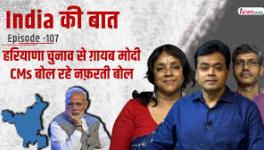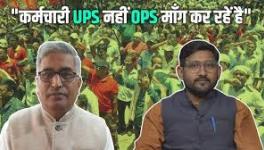Protesting Farmers Remember Mahendra Singh Tikait and Historic Boat Club Agitation
New Delhi: Even though Chaudhary Mahendra Singh Tikait passed away a decade ago (May 16, 2011), farmers from western Uttar Pradesh invoke the legendary peasant leader and his historic 1988 Boat Club stir in Delhi till this date to assert that they will force the government to accept their demands — roll back of three newly enacted agricultural laws and legal guarantee on minimum support price (MSP).
Issuing a warning to the ruling Bharatiya Janata Party, the farmers also quoted two MPs of the saffron party — AK Patel and C Janga Reddy — who had warned the then Rajiv Gandhi-led Congress government that, “An agitated farmer means an agitated nation.”
“History is witness to the fact that the Boat Club protest took a toll on the Congress government, which was uprooted a year after in 1989 (general elections). The incumbents must not forget it,” said one of the elderly farmers camping at Ghazipur border (one of the five gates of the national capital where a peaceful sit-in is going on since November 26), who also had taken part in the 1988 strike.
WHAT HAPPENED IN 1988?
Demanding higher remunerative prices for sugarcane produce, waiver of water and electricity dues and concessions in their tariff, the Bharatiya Kisan Union (BKU) under Tikait’s leadership had gheraoed the office of the divisional commissioner in Meerut. Afar a series of consultations between officials and the protesting farmers failed to convince the agitators, then Uttar Pradesh Chief Minister Vir Bahadur Singh had also invited Tikait to Lucknow for discussions.
But for the farmers of the Jat-dominated western Uttar Pradesh, Delhi was closer than Lucknow. Congress was at the helm of power at both places, with Delhi having higher leadership. Therefore, on a call from Sisauli (Tikait’s home in Muzaffarnagar), around 5 lakh farmers from different villages of the region marched towards the national capital with their 35-point charter of demands and laid a siege at the Boat Club lawns on October 25, 1988.
“Then too, we had to break barricades to enter Delhi, but the police did not use brute force,” 75-year-old Tilak Ram, a resident of Bhaura Kalan in Muzaffarnagar, told NewsClick at Ghazipur protest site.
Also see: January 26 Parade: Jawans on One Side, Kisans on the Other
Going down the memory lane, he recalled, “It was a spectacular show. The Boat Club flaunted a rural life, with people — huddled around bonfire — sucking hookah. Babba Tikait had turned that area of Delhi into a village panchayat. There were charpoys, buffaloes and carts. We used to milk buffaloes twice a day and cook food on wood fire.”
Seventy-eight years old Chandar Shahanshah from Muzaffarnagar added that a week had passed since the sit-in was organised, and the Congress had to organise a gathering to mark the death anniversary of Indira Gandhi at the same venue.
“The police employed all tricks to evict us from the Boat Club. Water and food supplies to the area were stopped. To make us and our cattle uncomfortable, loud music was played in the dead of night. When these tricks did not work, instead of using force and chasing us from Boat Club, the venue was shifted to the Red Fort ground. But the very next day, the government accepted the demands and the sit-in was called off,” he said.
Months later, then Uttar Pradesh Chief Minister ND Tiwari signed a deal with the BKU, conceding many of its demands, before the Lok Sabha elections of 1989.
The ongoing protest is taking place 32 winters after the historic stir, and farmers have been waiting at the borders of the national capital since November 26 — with several rounds of talks failing to end the deadlock.
“Back then, the prime ministers and his cabinet ministers, irrespective of their influence and popularity, never stretched a massive protest for so long. Respecting democracy, they came forward, held dialogues and ensured both sides reach a consensus. What is stopping (Prime Minister) Modi from reaching out to us on his own?,” asked 70-year-old Sukhbir Singh from Kharar village in Muzaffarnagar.
Agreeing with Singh, 64-year-old Ashok Kumar from Baghpat, stretching his legs towards one of the bonfires lit in a corner under the Ghazipur flyover to keep the protesters warm, said the government those days were not so “stubborn” and used to give in so that life could return to normal.
Also read: Folklore Behind Lohri Strengthens Farmers’ Resolve at Tikri Border
But at the same time, he credited senior Tikait’s magical influence on farmers and his honest commitment for peasants’ causes.
“Chaudhary Saab had some magical influence on farmers and the government of the day. His unorthodox ways of protest made him a leader who could deal with difficult and unpleasant situations. He used to roar like a lion, and no one ever dared to confront him because of his honesty and selflessness. He was a ‘bhagat’ (Bhagat Singh) of sort. He had a group of experts from different social and educational background who used to negotiate with the government on his behalf. But he never let his fame and huge following turn his head,” Kumar added, showering praise on the late BKU leader.
Dinesh Baliyan from Muzaffarnagar added, “Tikait might have faded from the public memory as new generations have emerged in in the past one decade or more, but back in 1980s, the governments in Lucknow and Delhi used to get rattled with his mere announcement of an agitation.”
“He very effectively used the power of farmers to fight for their rights. Tens and thousands of farmers used to troop out of every village for a siege that he lifted only after his demands were met,” he recalled.
FARMERS’ MOVEMENT – THEN AND NOW
Drawing parallels between the ongoing agitation and the Boat Club stir, 69-year-old Sabarpal Singh from Amroha in Uttar Pradesh said that the 1988 agitation had participation of farmers from western Uttar Pradesh only, but the ongoing strike have farmers from across the country and for a larger cause of peasants.
“It is more inclusive and has much bigger scale than the Boat Club protest,” he pointed out, saying that “woh zamana dusra tha, yeh zamana dusra hai (that era was different, this age is different)”.
Tikait came to the limelight in North India after peasant leader Chaudhary Charan Singh slipped into illness and later passed away. But according to experts, he failed to make himself a voice of pan-India peasants in Delhi. Sharad Joshi of the Shetkari Sangathan of Maharashtra and Ajit Singh of the Rashtriya Lok Dal emerged as peasants’ leader in the VP Singh and Narasimha Rao led governments, respectively. Interestingly, both of them trusted on the legendary leader’s ability to gather support.
Explaining this, Sabarpal Singh told NewsClick, “When farmers laid a siege at the Boat Club, the winter session of Parliament was to begin in the next few days. The government bowed to the farmer demands, resolved the dispute and the scheduled session took place. But today, the Modi government, instead of listening to our grievances and attempting to address them, is playing all dirty tricks to scuttle the protest. It cancelled Parliament’s winter session to avoid questions on its failures.”
Sukhbir added, “At that time too, the media (Doordarshan and the All India Radio) was controlled by the government. We had the only option to tune into BBC or wait till the morning for newspapers to get a real picture of what is happening. There was private 24X7 TV news channels, but no mobile phones and no Internet. Today, when apart from the government-run media platforms, private television networks are also compromised, we have the option of the social media — which are raising people’s concerns.”
Also read: Farmers' Protest: Western UP Khap Leaders Plan to Block Loni Border From January 17
One striking similarity between the two agitations, almost all of them pointed out, is the non-alignment with any political party.
“The BKU then had not allowed politicians to use its stage to address farmers. Tikait wanted to keep it that way. Perhaps, it was one of the major reasons for its success. Newspapers noticed the fact and several editorials were written on it. As a result, the protest got public sympathy. Similarly, in the ongoing agitation, striking unions have not allowed their politicians on their stage. That is why, public sympathy has started gravitating towards the farmers,” Sukhbir said.
Commenting on the Congress’s failure to win votes (in 1989) despite the incumbent government accepting the farmers’ demands within a week of the protest, 83-year-old Rajendra Singh from Meerut said, “The Rajiv Gandhi government was mired with the Bofors scandal controversy. It had led to the resignation of VP Singh who following the 1989 elections as a leader of the Janata Dal was elected as the prime minister. The unpopular Congress had huge anti-incumbency then.”
Get the latest reports & analysis with people's perspective on Protests, movements & deep analytical videos, discussions of the current affairs in your Telegram app. Subscribe to NewsClick's Telegram channel & get Real-Time updates on stories, as they get published on our website.
























